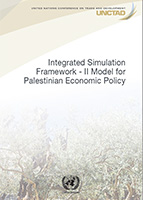
The economic policy framework that defines the operation of the Government of the State of Palestine, featuring a limited policy space and a narrow range of policy instruments, has been shaped by the 1994 Paris Protocol on Economic Relations between the Palestinian Liberation Organization (PLO) and Israel. To capture the structure and modus operandi of the Palestinian economy, UNCTAD developed its first generation of Integrated Simulation Framework (ISF) in 2006 to model the Palestinian economy post the establishment of the Palestinian National Authority (PNA).
In 2009, UNCTAD provided the Palestinian Central Bureau of Statistics (PCBS) with an updated version of the ISF. PCBS has been using that version to forecast key socioeconomic variables and conduct alternative policy simulations and scenario analysis for planning and assessment of the performance of the Palestinian economy.
Since the development of the first ISF, significant structural changes have taken place in the Occupied Palestinian Territory, and more data and information have become available. Accordingly, UNCTAD deemed it necessary to upgrade the structure and design of its ISF and update its macro-econometric modelling of the Palestinian economy. The new analytical framework sketched in this study builds on the previous version of the model and seeks to overcome some of its limitations while allowing for more flexibility in assessing recent developments and trends.
The goal of the new analytical framework is to assist Palestinian policy makers, and other concerned parties, in formulating sound economic policies guided by clear understanding and assessment of the impact of alternative, competing policy packages so that they can chart the best policy course for budget planning and pursuit of the Sustainable Development Goals.




